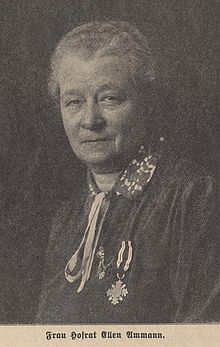Secular Institute Ancillae Sanctae Ecclesiae

The secular institute Ancillae Sanctae Ecclesiae (ASE, de : Servants of the Holy Church ) is a Munich- based Roman Catholic institute of consecrated life in the form of a secular institute . It was founded in 1919 by Ellen Ammann .
history
Ellen Ammann (1870–1932) was a committed politician, member of the Bavarian state parliament and church activist . She first developed the idea of the “third profession” which could be classified in a consecrated life alongside the religious woman , married women and mothers. In 1904 she founded the first branch of the Catholic Women's Association . In 1911 she published her first idea of the “third profession”. Together with Archbishop Michael Faulhaber of Munich and Freising and 7 founding members, she founded the first community in 1919 called the "Association of Catholic Diakoninnen". The community acquired a house on Clemensstrasse in Munich, this developed into the center of activities and has remained the home of the community to this day. In 1952 the community was recognized as a secular institute by the former religious congregation and was given the name "Ancillae Sanctae Ecclesiae - Servants of the Holy Church". The secular institute is divided into the regional groups Munich, Fürstenfeldbruck , Nuremberg , Berlin , Mannheim and Dortmund . The secular institute currently has 50 members.
Spiritual guiding principles
In the spirit of the deaconesses, the members want to accompany other people to a meaningful existence with their life and faith, their talents. Their leaders include, for example, the biblical women Lydia ( Acts 16.14 EU ), Tabitha (Acts 9.36 EU ), Phöbe ( Romans 16.1 EU 16.1), Tryphosa (Romans 16.12 EU ) and Juliet (Romans 16, 15 EU ). The founder Ellen Ammann coined the following principle for the community:
"Nothing extraordinary, but the ordinary exceptionally good and finally persistent."
The community shapes its life according to the three counsels of poverty, celibacy and obedience from the Gospel . All members are subject to a community rule that includes fraternal togetherness as a basis. Part of a community life shaped by Ignatius von Loyola , the founder of the Jesuit order , is participation in the Eucharistic celebration , prayer and meditation , scripture reading and daily review.
activities
All activities take place in the main building, including monthly meetings of the regional groups, annual retreats , spiritual weekends and advanced training courses. A monthly newsletter is published.